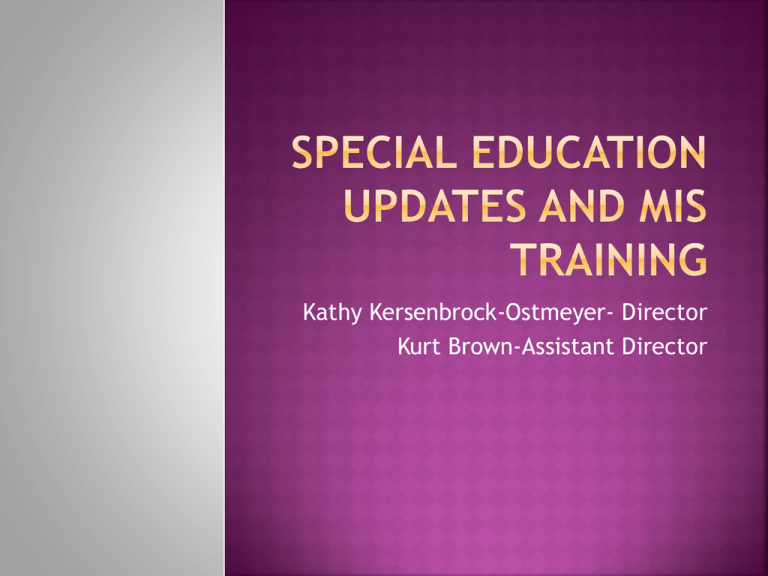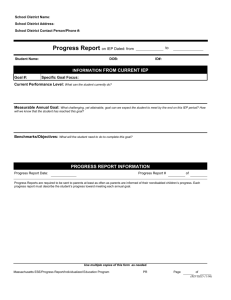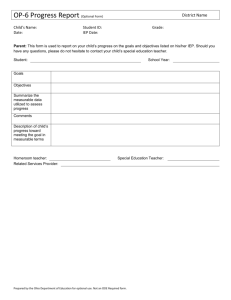PowerPoint - Northwest Kansas Educational Services Center
advertisement

Kathy Kersenbrock-Ostmeyer- Director Kurt Brown-Assistant Director A Review of District Data School Teams All data is by district except Indicator 20, Timely and Accurate Data 2012-2013 data is reported in 2014 and so on RESULTS DRIVEN ACCOUNTABILITY (RDA) NEW PROPOSED STATE PERFORMANCE PLAN (SPP) STATE SYSTEMIC IMPROVEMENT PLAN (SSIP) 2013 SUMMER LEADERSHIP CONFERENCE EARLY CHILDHOOD, SPECIAL EDUCATION AND TITLE SERVICES (ECSETS) RESULTS DRIVEN ACCOUNTABILITY (RDA) OSEP is reconceptualizing its accountability system. That system, Results Driven Accountability (RDA), is aligned to best support States in improving results for students with disabilities. RESULTS DRIVEN ACCOUNTABILITY (RDA) Previously, OSEP’s accountability system, including the SPP/APR, was heavily focused on compliance with statutory and regulatory requirements, with limited focus on how the requirements impacted results for students with disabilities. RESULTS DRIVEN ACCOUNTABILITY (RDA) RDA balances the focus on improved educational results and functional outcomes for students with disabilities while considering compliance as it relates to those results and outcomes. The SPP/APR is a critical component of RDA PROPOSED FFY 2013 – FFY 2018 SPP/APR As the result of these proposed revisions, the SPP/APR will include 17 indicators 1. Graduation 2. Dropout 3. Assessments 4. Suspension/Expulsion 5. LRE 6. Preschool LRE 7. Preschool Outcomes 8. Parent Involvement 9. Disproportionate Representation 10. Disproportionate Representation – disability category 11. Evaluation Timelines 12. Preschool Transition 13. Secondary Transition 14. Post-school Outcomes 15. Resolution Sessions 16. Mediation 17. State Systemic Improvement Plan (SSIP) Lawsuits Due Process Proceedings Formal Complaints The Uninterrupted Scholar’s Act Extracurricular Kansas Emergency Safety Interventions Regulations (Adopted by the Kansas State Board of Education on February 13, 2013. Became law on April 19, 2013.) Article 42. – EMERGENCY SAFETY INTERVENTIONS 91-42-1. Definitions. As used in this regulation and in K.A.R. 91-42-2, each of the following terms shall have the meaning specified in this regulation: Emergency safety intervention” means the use of seclusion or physical restraint when a student presents an immediate danger to self or others. Violent action that is destructive of property may necessitate the use of an emergency safety intervention. Chemical restraint” means the use of medication to control a student’s violent physical behavior or restrict a student’s freedom of movement. Mechanical restraint” means any device or object used to limit a student’s movement. Physical restraint” means bodily force used to substantially limit a student’s movement. “Time-out” means a behavioral intervention in which a student is temporarily removed from a learning activity without being confined. Physical escort” means the temporary touching or holding the hand, wrist, arm, shoulder, or back of a student who is acting out, for the purpose of inducing the student to walk to a safe location. Seclusion,” when used with a student, means that all of the following conditions are met: (1) The student is placed in an enclosed area by school personnel. (2) The student is purposefully isolated from adults and peers. (3) The student is prevented from leaving, or reasonably believes that the student will be prevented from leaving, the enclosed area. Students Exiting Students Entering Service Dates and Times What Happens in the Spring? SUBMIT!!!!!!! Check all of your data yearly!!!!!! KIDS ID number AYP school has changed to Accountability School Remember the address switch feature Update Screening dates The exit date is the last day the student received services The enter date is the first day they come to school or receive service A meeting notice is required For an annual IEP, Meeting to discuss potential changes to the IEP, Determining Eligibility 10 days written notice is required unless the parent waives that right. Students 16 and older need to sign the notice showing that they were invited to the meeting You must document on the meeting notice the reason why an IEP runs late. IEP Process Exit Referral Evaluation (and Eligibility) Progress Reporting Present Levels of Academic Achievement & Functional Performance Services Short-Term Objective and Benchmarks Prioritize Needs and How Needs Will be Addressed Measurable Annual Goals Present Levels of Academic Achievement & Functional Performance (PLAAFPs): a) are the way you identify and prioritize needs and b) establish baseline performance in order to develop an individualized and meaningful plan. c) identify degree of match between skills & environment Examples 1)CURRENT PERFORMANCE Learning Strengths Standardized Assessments Strengths and Weaknesses Vocational/Career Interests Instructional Preferences Skills related to Interests Learning Rate Independent Living Skills Social Issues 2) IMPACT OF EXCEPTIONALITY Which Standards are Appropriate Birth-6 Curriculum Measures Instructional Level Routines Based Assessments Reading Level District Assessments State Assessment Performance on Classroom Tests How Behavior affects ability to progress or access general curriculum — — — — — — — — — Non-Special Education Supports Program Modifications Supports for School Personnel Assistive Technology Supplementary Aids & Services Positive Behavioral Supports Transition Services Related Services Measurable Annual Goals 3) PROVIDE BASELINE DATA FOR EACH IDENTIFIED NEED Words Read Correctly Mean Length of Utterances Correct Responses Percent Correct Number of Times Behavior Occurs Correct Math Problems Correctly Answered Questions Running Records Error Analysis REFLECTIVE OF SKILLS ADDRESSED IN STANDARDS When you lie awake at night thinking about your child what is it that you worry about? What does the hour from hell look like in your home? What do you hope for when your child becomes an adult? Kansasprojectsuccess.org CHAMPS LTERS (Math) Does it pass the stranger test? What are the needs? How significant are the needs? Is there specialized instruction and if so does it address the needs? Say NO to “As Needed” Indicator 13 The Transition plan is the shared responsibility of all the team members Postsecondary Goals are important This drives the IEP as per law IEP Process Exit Referral Evaluation (and Eligibility) Progress Reporting Services Short-Term Objectives and Benchmarks Present Levels of Academic Achievement & Functional Performance Post Secondary Goals Prioritize Needs and How Needs Will be Addressed Measurable Annual Goals Functional for the child Priority to the family Usable across settings, people and materials Address multiple areas simultaneously Match the child’s developmental level Usable within the child’s daily environment Observable and measurable Builds towards postsecondary goals Measurable Annual Goals describe the anticipated progress that will result from specially designed instruction the student will receive. Based on data contained in the PLAAFP Has 4 Components: a.Behavior b.Conditions c.Criteria d.Timeframe Identify and select a need from the PLAAFP. Consider the general education standards and curriculum for the student’s grade level and age/grade expectations for other performance skills. Identify the performance to be measured. (Behavior) Specify how the progress toward the goal will be measured. (Condition) Determine to what level the behavior must occur. (Criteria) Specify amount of time that will be required for the student to attain the criterion. (Timeframe) Does it pass the stranger test? Is it based upon a need for specialized instruction? Does it contain the four elements? Behavior Conditions Criteria Timeframe There will NO KAMM this year! There are two choices. Either the general assessment with accommodations or the alternate assessment New guidelines for qualifying for the alternate assessment-(Website) Students taking the alternate assessment will utilize the new format for Reading and Math Science will be the old way Social Studies and Government will be a pilot On the IEP only write Alternate. DO NOT write any extended standards on the IEP. As you write new IEPs change those using the KAMM to either the general assessment with accommodations or the alternate whichever is the most appropriate. Replace the F service code with G New code for Gifted only under long term suspension. The code is S when a student is no longer receiving services due to the suspension For students who move in the beginning date is the date they started school The end date is the same that they came in with Make sure your start dates and end dates are correct You can start over on the services page if you make it a new IEP Technical errors can be fixed without a meeting Procedural errors must be fixed with the parent The parent does only need to sign once. Have legitimate potential harmful effects. This is the most important form! Make sure it is current to what you are currently providing ESI? Still pockets of excess but much better overall Whether you utilize new data, existing data or a combination of both you must always complete an evaluation report! Initial comprehensive evaluations should be ever increasingly purposeful in regards to the data collected and the assessments administered. (What does that mean?) We must have good front side communication in regards to all evaluations!!! Dyslexia Indicator 11 We have 60 school days to complete an initial evaluation!!!!!! EC Evaluations Hippa Must change the relevant IEP pages including the services page if appropriate Must complete and have the parent sign a change of placement form Must inform all team members of the change You need administrative permission to complete an amendment These paper. are mandatory whether online or on This is the full IEP team responsibility Make sure this is accurate and do not project or predict future performance Random Moments in Time Key Words There is a new one time consent form that must be signed for every student this year and whenever a student moves into the district. This form must be signed immediately for every Medicaid eligible student It must signed for all other students when their IEP comes due It must be signed upon referral to special education This form has been updated again. You must complete this form immediately for every Medicaid eligible student This is to be used in only very unusual and specific circumstances If a local administrator is attempting to be excused please inform us immediately Transcripts Letter to Runkle






